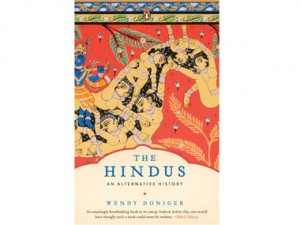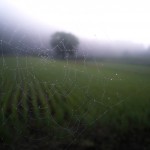I’m exhausted. School is out and I have an infant and two kids all day, every day. I haven’t adjusted yet. I need more structure or the eldest child will be the death of us all. Last week was also my birthday, so there were a few fun birthday gatherings. Last week was also my blog post about Wendy Doniger’s controversial alternative history of the Hindus, and with that came all the comments. And those comments were intense. Processing those on top of everything else left me feeling very overwhelmed.
For a few days I felt a little crazy. To my eyes, it seemed like most of the commenters hadn’t read the book or my review. Why were they repeating the very same objections I had already disagreed with in my review? Worse, why was I starting to repeat myself? What was I missing? Why wasn’t I making sense to them? The worst part came when I found myself using phrases and arguments that have long been used against feminists – “It was humor! Maybe you just don’t have a sense of humor!” That’s when I realized I was completely unprepared to write that book review. I could read and have an opinion on the book, sure. But I didn’t understand the wider context – not the context of the author, nor of those offended. The handful of negative reviews I had read made sense to me, because the English language makes sense to me, but I didn’t appreciate their context.
 It’s not that my review was totally off the mark. Many Hindus, much like the orthodox in other traditions, aren’t interested in the voices of those on the margins. Some of the objections in my comments sounded like they were repeating such objections. Doniger’s book was focused precisely on these voices from the margins of the Hindu spectrum. Some Hindus think this is a good thing, that the book “is not an insult to religion but a tribute to its complexity.” I agree that Doniger’s book is a good thing. It certainly fills in a lot of the missing pieces from the classes I took in college that covered India and Hinduism.
It’s not that my review was totally off the mark. Many Hindus, much like the orthodox in other traditions, aren’t interested in the voices of those on the margins. Some of the objections in my comments sounded like they were repeating such objections. Doniger’s book was focused precisely on these voices from the margins of the Hindu spectrum. Some Hindus think this is a good thing, that the book “is not an insult to religion but a tribute to its complexity.” I agree that Doniger’s book is a good thing. It certainly fills in a lot of the missing pieces from the classes I took in college that covered India and Hinduism.
Some people object that Doniger’s ideas will be the ONLY ideas in its field. How silly, I thought. How could her ideas be assumed to be the only ideas? How could some one who writes about the fringe be taken for the mainstream? I disregarded these objections. However, I was wrong. After further research and discussion with a professor at a major university, I learned that right now Doniger is indeed the sole voice for Hinduism in the academy. This is extremely limiting! Of course there should be more voices! And yes, it would be great if more Hindus were in the field!
The issue of humor is interesting. I was appalled at how I became a type of “mansplainer,” basically telling people who didn’t find stuff funny that they didn’t understand American humor. Now, some of my commenters did not write in the most eloquent English, so maybe English isn’t their first language and maybe they didn’t get the puns and jokes with which Doniger peppered her book. And maybe they did and they still didn’t like it. All I can say, I feel dirty having told people I don’t know that they didn’t get the joke. That was gross of me.
However, a Hindu wrote about this issue and loved the humor. Whether or not people did or did not get the jokes, I was really uncomfortable being in the seat of the intellectual oppressor. That’s not a position I am in very often. In the past I have been the only woman in the room/class/discussion, the only non-Christian, the only liberal (or whathaveyou), and so on. I’m used to being the odd voice out. I’m not used to being the person in a position of power (other than when I have been a teacher, which is a different dynamic than being a white person arguing about Hinduism with Hindus). In this case I let my academic arrogance get in the way of listening and understanding.
It’s hard to understand one another when each party is speaking in different languages. All the dialog was in English, but we were not speaking the same language. It turns out that we may not have all been using the same words with the same meanings. This was another area that my scholar friend helped me understand. I had no idea how vastly different the understanding of scholarship in the field (or non-field) is in India. I knew that ‘Indology’ (the study of India in the West) and Hinduism are Western constructs. But I didn’t understand that the way we study religion and history over here is NOT the way it is done, approached, or thought of over there. Apples and oranges.
From a Western point of view, Doniger’s book is a great contribution to our understanding of Hinduism. I can’t speak to how accurate her Sanskrit or history details are. I cannot speak for any view point other than my own. This book will piss off any one who wants a monolithic Hindu agenda to push out already marginal voices. It will piss off any one who thinks that sacred things should only, ever be spoken of by people on the inside. I’m not in either of those groups.
But I’m certainly ignorant of what it means to be Hindu. For all of my sincerity to my Hindu practices, I am no Hindu. I’ve never claimed to be. But last week I saw the intensity of my white Western heritage in ways I never expected. It was a most uncomfortable education.















